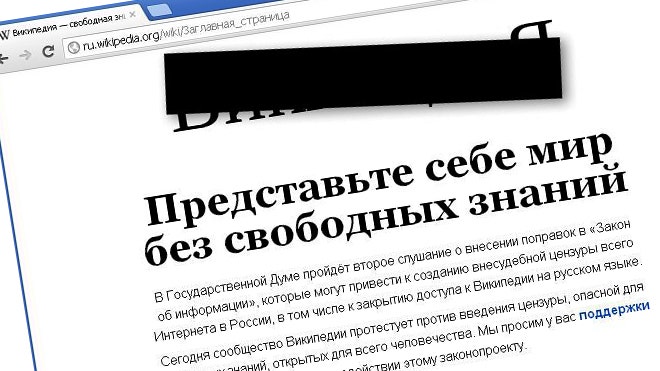
The Russian version of the online encyclopedia Wikipedia on Tuesday closed its site in one day a protest against what they said were the plans of President Vladimir Putin to create their own version of "Great Wall of China" to block Internet dissidents.
Supporters of the amendments of the law of information from Russia, who proposed the ruling party, United Russia, which will be discussed in Parliament on Wednesday, say the changes are necessary to protect children from dangerous places.
But the leaders of the protests antiPutin say the new law could close without a court order websites like Facebook and Twitter and aims to curb opposition movements, which are organized through social networks.
"These amendments may become a basis for true Internet censorship, forming a list of banned sites and IP addresses," said Wikipedia in Russia in a statement.
"The following provisions and the terms under discussion lead to the creation of the Russian equivalent of the 'Great Wall of China' in which access to the Wikipedia could close soon throughout the country."
Changes to information law would give government officials power to order the closure of websites without a court order, simply including them in a blacklist. China has some of the most effective methods to block Internet dissidents, closely controlling what can and can not be viewed.
Under the proposed changes in Russia, if the owner of a website does not remove content that is deemed inappropriate, the entire site can be blocked.
Opposition leaders and Russian citizens have used Facebook, Twitter and Russian site Vkontakte network to organize protests and distribute information antiPutin since the demonstrations began for the alleged violations in parliamentary elections last September.
"It's basically an attempt to infiltrate the last bastion of the opposition: the Internet. It is an attempt to kill the protest movement that depends on Internet. For me it is spelled 'China', which seems to be the direction we're headed" said opposition activist Natalia Pelevine.
Since Putin became president in May after four years as prime minister, Parliament has rushed to pass laws that increase penalties for protesters who exceed the line and is considering stricter rules for NGOs.
The opposition says the proposed changes in the law, and recent records in the houses of the event organizers, intended to quell the protests against Putin. The Kremlin denies it.







0 ความคิดเห็น:
Post a Comment